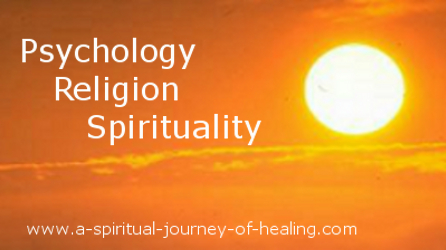A Journey with Psychology Religion Spirituality
Psychology religion spirituality have intertwined over the
centuries, perhaps even more so in recent decades with the wealth of popular
psychology books available.
When I first experienced chronic illness I knew I needed to reach out and learn from the wisdom of others. I read psychology self help books. I received some counselling.
Later, I combined psychology with reading spiritual books - A Course In Miracles was and continues to be an influence.
Later again, my journey led me to make my peace with religion.
Having had the time and freedom to question my beliefs, I came to a point of reconciliation with the
(Catholic) Christianity of my youth.
I now draw on all three approaches - psychology religion and spirituality. I probably spend most time on what could be termed as psychological approaches.
But the context in which I do so - my view of life, the Universe and everything ;-) is most definitely spiritual.
If we follow practices from all three approaches: psychology
religion spirituality, there will be conflict at times between the approaches.
As a result, we may experience self
conflict and confusion.
In this article I clarify a few of the differences, so that
in any instance you can more easily identify your favoured approach.
To receive Releasing Judgment, a FREE ebook
or just to keep in touch, sign in below.
Your email will definitely not be misused
and you can unsubscribe at any time.
With love, Katherine
Contents for Psychology Religion Spirituality
- Psychology, religion, spirituality - objectives and benefits.
- Someone’s spirituality and religion are relevant to any psychological approach they take
- Inner voices
- Quieten the mind
- Our need for order and stability
- Other articles relevant to psychology religion spirituality
An additional article discusses the following:
- How do these approaches help you feel ok with the life you have?
- Can psychology and spirituality help you improve your circumstances? Are you deserving? Are you entitled?
- Can these approaches help to raise self worth
- What do these approaches say about the importance of how you are treated by others
- My continuing journey with psychology religion and spirituality
Psychology religion spirituality.
Objectives and benefits.
The objectives and potential benefits of psychology
Psychology definition: the science that deals with our mental and emotional processes along with our behaviour.
Some objectives of reading and applying psychology may be as follows:
- to be happier
- to lead a more fulfilling life
- to have an enhanced feeling of connection - to feel comfortable in our relationship with ourselves and others
- gain a better understanding of ourselves
- to increase our psychological resilience to the difficulties of life
- to gain information that gives us a sense of understanding the way things are
The benefits of pursuing a spiritual path
FREE
Forgiveness E-Book
From the author of this website,
please help yourself :-)

Your email will definitely not be misused!
Katherine
The objective of finding greater happiness or fulfillment may be shared by those pursuing the spiritual journey.
One difference between psychology and spirituality is that the spiritual path leads us in many ways to let go of attachment to the appearance of our world.
The source of happiness and fulfillment is not seen as being in the world but in a relationship with Spirit, God.
One difference between psychology and spirituality is that any increase in connection from the spiritual journey comes as a by-product of
feeling connected with Source, with God.
We learn to
receive the love that is available to us.
Our sense of ease with ourselves is increased by seeing ourselves not as separate and alone but as inherently connected with something beautiful of which we are a part.
Just as psychology might improve our resilience
to the difficulties of life, so we might gain resilience
from
pursuing spirituality.
Knowing ourselves as loved by God improves our
resilience.
Drawing on a source of strength beyond ourselves improves our resilience.
Lack of attachment to
our world looking a certain way reduces our dependency on the circumstances of our lives and thereby improves our resilience.
We can see that psychology and spirituality are two different approaches with different objectives which nonetheless share the potential benefits of guiding us in
- how to be happier
- how to live a more fulfilling life
- how to have a better relationship with ourselves
- how to be more resilient to the difficulties of life.
Psychology may have an aim of moving towards these outcomes.
Spirituality potentially achieves these outcomes as a by-product of a relationship with Source or God.
The objectives and potential benefits of religion
Ideally religion provides community,
belief systems, rituals etc which serve to help someone in their
commitment to spiritual practice.
In so far as religion assists in helping someone to apply themselves to their spiritual practice, the benefits
of religion overlap with those of spirituality.
However, looking at the four objectives above, in my experience the particular strength of religion is that it helps to increase resilience to the difficulties of life.
It does this through
- a sense of community,
- a sense of belonging
- a sense of stability
- spiritual and moral teachings.
Go here for definitions of religion along with additional definitions of spirituality - these are definitions which don't overlap with the definition of psychology.
Psychology Religion Spirituality:A person’s spirituality and religion are relevant to any psychological approach
Any psychological approach is likely to look at how the following work for a person and how they can work better:
- someone's belief system,
- someone's value system
- someone's behaviour
Since someone's spirituality and religion impact on both their beliefs and values, a person’s spirituality and religion are, or should be, relevant to any psychological approach.
The psychiatrist, M Scott Peck– author of the wonderful psychology book, The Road Less Travelled– named 4 Stages
of Faith to help identify where all of us are on this journey of faith.
He
stressed the need for the psychological approach to work with someone’s belief
system in order to assist them in self growth and change.
More and more, the psychological approach is recognising the role that a person's spirituality and religion play in any therapy.
Psychology Religion
Spirituality:
What do they say about Inner voices?
Psychology religion spirituality– all acknowledge the presence within us of conflicting inner voices. Approaches from each area can help us to quieten the chattering mind.
The spiritual journey is one in which we aim to let God speak to us and guide us.
With regard to inner voices, religion (and/or spirituality) may use the language of learning to listen to ‘the voice for God’ or the still small voice as opposed to ‘the voice of the devil’ or the voice of the ego.
We can be assisted in the spiritual goal of hearing God's voice by the use of psychological self help techniques to identify the ways in which our inner voices, our preconceptions and our allegiance to outdated rules, block our access to such wisdom.
The psychological approach may use the language of getting in touch with ‘our authentic self’ or with ‘the voice of our conscience’.
Many psychology techniques help us to acknowledge and examine inner voices that may not be acting in our highest interest.
Examples of voices in psychology:
Transactional
Analysis helps us identify the voices of Child and Parent and make the
switch to an Adult voice based on a current up to date view of our world and
our choices.
Freud, within psychotherapy, considered the psyche to be structured as three parts- the ego, the id and the super-ego.
Cognitive Behavioural Therapy (CBT) and the meta model in Neurolinguistic Programming (NLP) help us to look at and challenge our assumptions so as to let go of psychological patterns of thought and behaviour that no longer work for us.
(NLP is a goal focused practical psychological approach to bringing positive change to one's life.)
NLP Parts therapy
considers different parts of us that pull in different directions - one
towards our goal and one away from it - and finds a common motivation
to unite the two and thereby enable progression towards a goal.
Psychology Religion Spirituality – all teach us to quieten the mind
As well as looking
to replace unhelpful inner voices, psychology
religion spirituality – all include practices to quieten the mind – to
allow ourselves a break from (or a gentle acceptance of) such voices.
Ten years ago
meditation was viewed as a spiritual practice and was largely dismissed by the medical establishment.
Since then science based
research has shown the health benefits of meditation. For example, healthy
structural changes in the brain can be measured in those who meditate.
In addition to having been a spiritual technique used within most or all of the major religions down the millennia, meditation is now used widely as a psychological technique
under the name of mindfulness.
Meditation was
recommended to me early on in my journey with the illness ME by Dr William
Weir.
Be Loved
Beloved
15 Spiritual Love Poems
God Love Self Love
Katherine T Owen's small beautiful collection of poems take the reader with her as she journeys to know both self love and
God's love.

Click to preview or BUY
the PAPERBACK of
Be Loved Beloved
Be Loved
Beloved
15 Spiritual Love Poems
God Love Self Love
(by the author of a-spiritual-journey-of-healing.com)
For 14 years, Katherine was severely disabled with ME/CFS, unable to walk, with little speech, and with inadequate care.
Katherine's small beautiful collection of poems take the reader with her as she journeys to know both self love and
God's love.

Download FREE software to read the kindle book on your computer.

Click to preview or BUY
the PAPERBACK of
Be Loved Beloved
Psychology Religion
Spirituality:
Order and stability
Stability is necessary as a base for positive change.
We explore spirituality best from a life that contains some order and stability.
Psychology self help can assist our spirituality by helping us to find the stability we need in
the world.
The psychiatrist M Scott Peck acknowledged our psychological need for
stability in his writing about the 4 Stages of Faith.
The first of the
Stages of Faith is Chaos– generally life will not be working well for us during
times when we are in chaos.
During the second of the Stages of Faith– Religious/Institutional – we adopt various beliefs and practices (not necessarily religious) to help us find order in the chaos.
Such stability is necessary to progress to further stages of
faith which may see us take a more flexible approach to life.
Psychology and religion can help us both to find stability and to find happiness within this stability.
In practice religion often helps to provide the stability we need. It is likely to offer a community which gives a sense of belonging and may even provide for a person’s needs when they are less able to care for themselves.
The possible pitfall of religion is that by maintaining stability through community and ritual it can sometimes resist change and stifle the true spiritual growth it was developed to support.
The spiritual path can lead to less stability
With both psychology and spirituality we are choosing to look at those things in our lives which aren't working - either to choose again - psychology, or to hand them over for healing - spirituality.
A
time of walking into the darkness is likely to be experienced as a time of chaos.
But on the other side of it is the expectation of greater
stability - based in a greater knowledge of oneself (psychology) or a greater ability
to receive God's love (spirituality).
Spirituality also opens us up to hearing the still small voice. Such promptings can lead us along unpredictable and unexpected paths.
Ultimately spirituality gives the message that there is no stability in the world. Stability is found instead in God’s love - the only certainty– the only thing we will never lose - the rock on which we can choose to build our lives.
Other articles relevant to psychology religion spirituality self help
Click through for a further article comparing psychology and spirituality.
- John Bradshaw is an author who has been important on my journey of self growth. His books are in the category of psychological self help (including Family Systems Roles). However, he combines discussion on psychology religion spirituality in his writing. His journey has included the need to set himself free from some unhelpful religious beliefs received early in life.
- I am a student of A Course In Miracles - a spiritual book which incorporates both psychological and spiritual guidance. It is not a religion.
- Move from Psychology Religion Spirituality to read (on my other website) about some books on mind body research. Many are likely to contain both psychological and spiritual insight.
Read my tips on practical psychology you can apply to your life. For me it was a journey with illness which motivated me to find better coping strategies. For you it might be a different challenge or just the desire for greater well-being.
Or click on the link below to visit the home page and find more inspiration on Practical Spirituality.
- Home
- Psychospiritual journey
Receive daily inspiration...
Receive daily inspiration by putting
your favorite (favourite) quote on
an item you see daily around your home-
a mug, cushion, postcard, coaster, T shirt etc.
You will find my zazzle gift store at
zazzle.com/HealingStore (USA)
Use one of my designs or start from a blank.
zazzle.co.uk/HealingStore (UK)
Thank you so much for supporting this website
www.a-spiritual-journey-of-healing.com
Katherine
My name is Katherine Owen.
Please respect my copyright as the author of this website.
I am delighted if you choose to share on social media, but please do NOT reproduce any of the contents of this page without permission.
© Katherine T Owen









